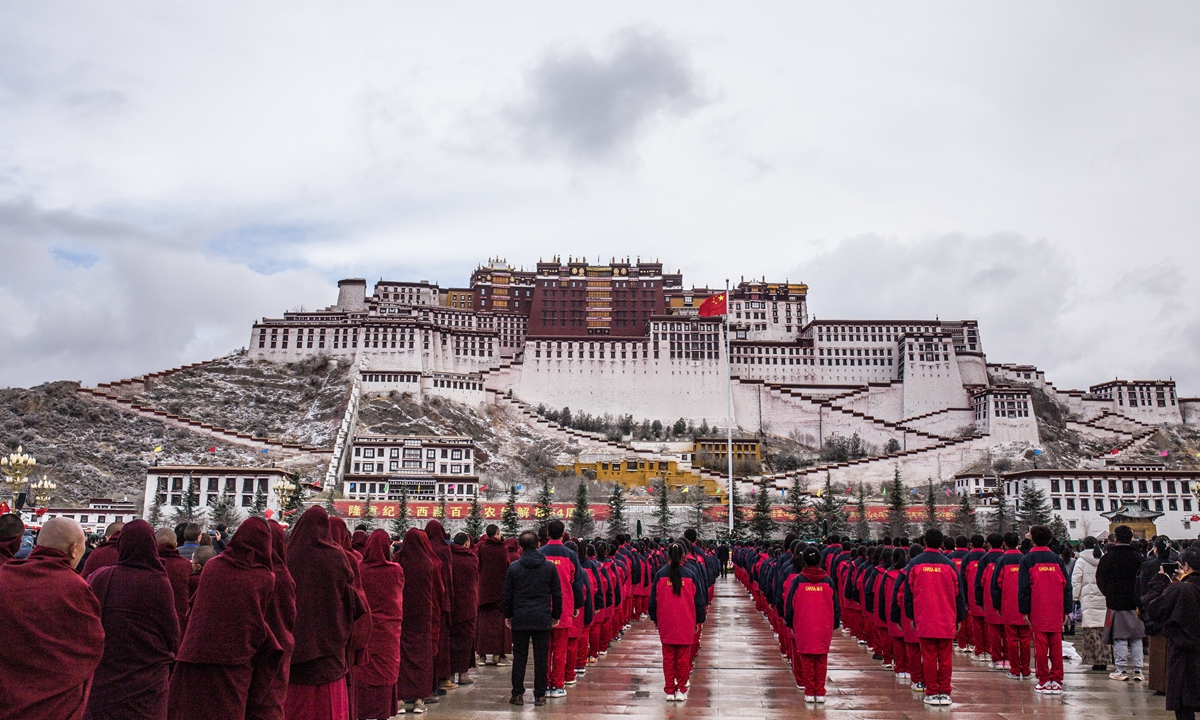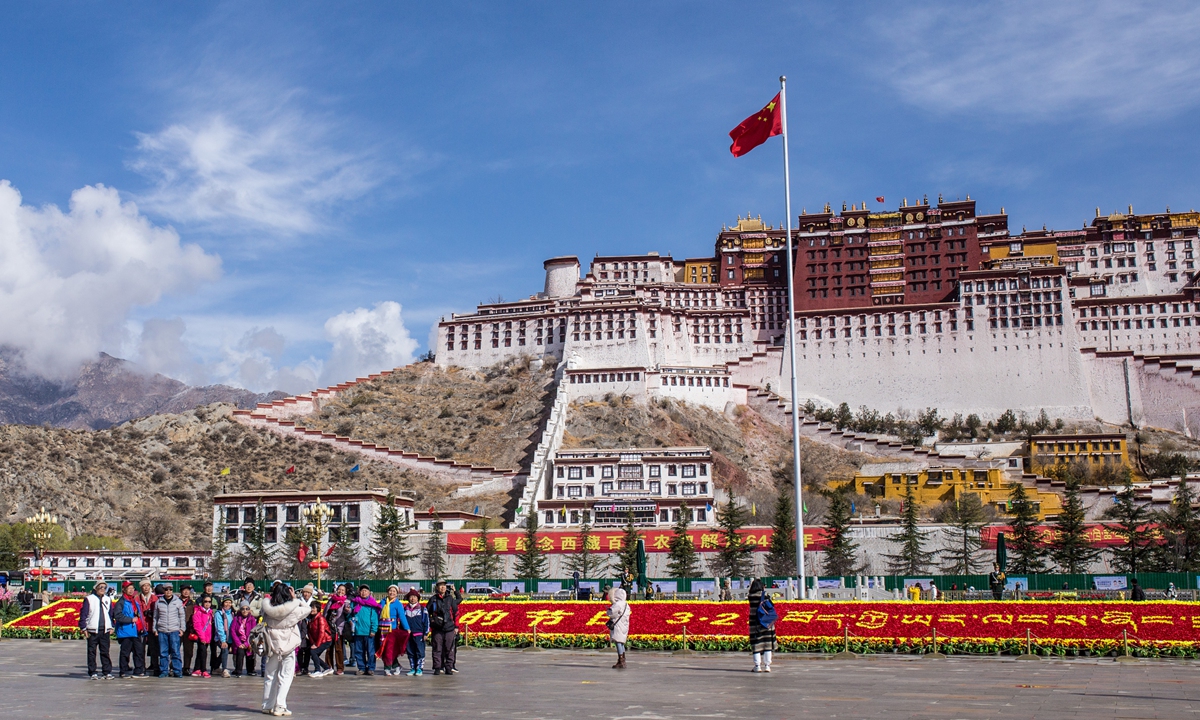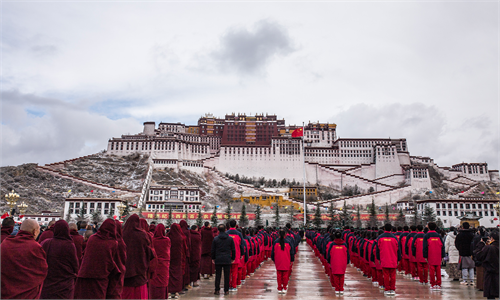
In a spring snow flurry, a flag-raising ceremony is held to celebrate Serfs' Emancipation Day at the square in front of the Potala Palace in Lhasa, capital city of Southwest China's Xizang Autonomous Region, on March 28, 2023. Photo: Shan Jie/GT
In a sprinkling of a rare spring snow, thousands of people from all walks of life and different ethnic groups saluted the Chinese national flag as the flag was slowly hoisted in the heart of Lhasa, Southwest China's Xizang Autonomous region.
Tuesday marked the 64th anniversary of Xizang's democratic reform. In the morning, the flag-raising and anthem-singing ceremony was held at the square in front of the Potala Palace to celebrate the Serfs' Emancipation Day.
As the ceremony proceeded, the snow gradually stopped, and the thick clouds dispersed, revealing a blue sky and bright sunshine. Tourists entered the square, taking pictures and leaving memorable moments.
On March 28, 1959, the Communist Party of China (CPC) led the people in Xizang to launch the democratic reform, abolishing Xizang's feudal serfdom under theocracy and liberating the serfs in Xizang, marking a historic leap in its social system.
In 2009, the regional legislature announced March 28 as a day to commemorate the emancipation of the 1 million serfs.
For 68-year-old Lhasa resident Trinley, it was his sixth time in a row to attend the flag-rising ceremony on the Serfs' Emancipation Day. On Tuesday, the man who was born to a serf family, wore a whole set of traditional Tibetan costume.
"In the old Xizang, we struggled to have enough food and warm clothing," Trinley told the Global Times. "Now, the tremendous changes in the lives of the Tibetan people are inseparable from the kindness and care of the Party. The policies of the government, such as building roads, providing water, caring for people with disabilities, and protecting Tibetan culture, have given us personal freedom and a happy life."
Padma Yudron, a 15-year-old freshman at the Lhasa Middle School, said that she was proud to attend the ceremony. "As one of the young people of the new era, I want to strive to get into a good university in Beijing, learn more professional knowledge, and contribute to the construction of the new Xizang," she said.
Padma told the Global Times that the life of her family have been constantly improving in the past years thanks to the favorable policies. Moreover, in Lhasa Middle School, she could not only accept bilingual education, but also grasp the skills of playing traditional Tibetan instrument Zhanian.
On Tuesday, people across Xizang commemorate the emancipation of serfs and their current happy lives in various forms.
The Global Times reporters met in the Tibet Museum some retired elders who had experienced the old society and were giving voluntary lectures to the younger generation, inspiring them to remember history.
In the Dzongyab Lukhang Park of Lhasa, a cultural performance was held to commemorate the 64th anniversary of the liberation of 1 million Tibetan serfs. Accompanied by the familiar melodies, the crowd swayed their Five-Star Red Flags and sang softly. Lhasa city also has hold Tibetan chess and football competitions to promote ethnic unity.
In the remote Medog county of Nyingchi city, about 400 kilometrs from Lhasa, a flag-raising ceremony was also held to commemorate this special day.
Cherish good life
After the democratic reforms, the people of all ethnic groups in Xizang have long since become the masters of the country, enjoying increasingly rich fruits of modernization. The economic and social development rights of people of all ethnic groups in Xizang are guaranteed.
The GDP of Xizang has increased from 129 million yuan in 1951 to 213.26 billion yuan in 2022. The per capita disposable income of Tibetan rural residents has maintained rapid growth, ranking first in the country in the past seven years.
From 1994 to 2020, the central government has supported a total of 6,330 economic and social construction projects in Xizang in various batches, with a total investment of 52.7 billion yuan. Outstanding officials were selected and dispatched to aid Tibet.
Global Times reporters learned from the transport department of Xizang that by the end of 2022, 662 towns and 4,382 villages in Xizang had access to hardened roads, with a connectivity rate of 95 percent and 78.76 percent respectively; 612 towns and 3,705 villages in the region can be reached by buses.
In the past 20 months, the Lhasa-Nyingchi railway provided southwestern Xizang with access to railway services for the first time in history.With a designed speed of 160 kilometers per hour, the 435-km railway marks the launch of the country's first electrified railroad operating in the plateau region.

In a spring snow flurry, a flag-raising ceremony is held to celebrate Serfs' Emancipation Day at the square in front of the Potala Palace in Lhasa, capital city of Southwest China's Xizang Autonomous Region, on March 28, 2023. Photo: Shan Jie/GT
True human rights
Although the development in Xizang is all-round and obvious to all, in recent years, some Western forces and the Dalai Lama clique with their followers wanting to conduct separatism have slandered Xizang endlessly. Experts said that the people in Xizang living a moderately prosperous life are the best evidence to crush the "human rights" lies of the anti-China forces.
For example, a recent smear claimed that students in Xizang are forced to go to boarding schools, separated from their parents, and forget about the Tibetan language and traditional culture. But through interviews in Xizang, Global Times reporters learned that the students are not forced to board, and many local students have received formal Tibetan language education in schools. Tibetan traditional culture has also been well inherited by the new generation.
In the 1990s, the "Tibetan government-in-exile" and some overseas anti-China organizations tried to use religion, "human rights" and other topics to undermine social stability in Xizang. The purpose was to turn Xizang into a card to contain China, Zhu Ying, a professor at the Baize Institute at the Southwest University of Political Science and Law, told the Global Times on Tuesday.
"The recent hype about the Xizang is an absurd and shameless smear campaign, showing their mentality of colonialism," Zhu said. "The Western world refuses to accept the right of every ethnic group in China to move forward and pursue a happy and better life."
"Today, Xizang is changing with each passing day, and there is no room for any anti-China forces to cause trouble. Their attempt to 'contain China with Xizang card' under the banner of 'human rights' is bound to fail," Zhu said.



